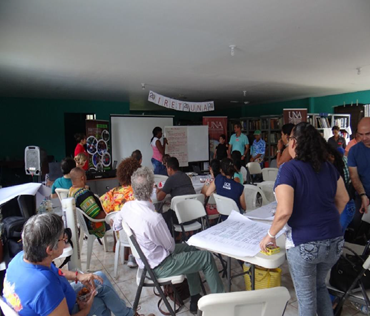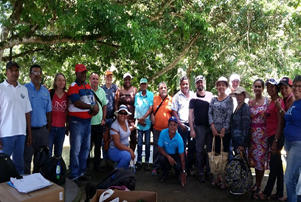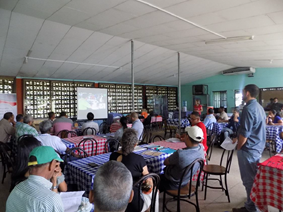During the second semester of 2018, three workshops were held in collaboration with the Matina community as part of the "Environment and Health in the Canton of Matina" gatherings. We invite you to download, read, and share this report at the following link:
http://10.0.96.35/isa/images/articulos/material_informativo/2020%20van%20Wendel%20de%20Joode%20et%20al%20informe%20tecnico%2042%201.pdf
These workshops focused on six main topics selected based on the results of various projects by IRET as well as issues identified by the community as needing attention:
- Aerial fumigations
- Ground applications of pesticides
- Fish killing
- Potable water
- Sustainable tourism
- Regulatory planning

The first workshop took place on September 1st, 2018, where collaboration occurred with representatives from all the development associations of the Matina Canton, as well as members of ASADAS (Water and Sanitation Boards), educational centers, cooperatives, public institutions, among others. This workshop focused on:
- Informing the Matina population about pesticide environmental contamination.
- Facilitating the exchange of ideas among key stakeholders to address identified issues.
- Collaboratively building initiatives to contribute to positive changes in the Matina Canton.
Following this initial workshop, it was decided to follow up on the tourism topic by sharing experiences with individuals in the Matina Canton who have already been developing tourism projects in the area. For this purpose, on Saturday, October 6th, 2018, a visit was made to the Madre de Dios Lagoon in the Pacuare Reserve and to the Pacuare Tourist Center. This follow-up activity aimed to delve deeper into sustainable tourism as an economic alternative for the area's development, with a more sustainable utilization of its rich biodiversity.

The third workshop, held on Thursday, November 22nd, 2018, was titled "Dialogue between Communities and Public and Private Institutions." In this workshop, participants:
- Learned about the results generated by various projects on pesticide and manganese environmental contamination conducted by IRET.
- Reflected on, reviewed, and supplemented the actions defined in the two previous meetings according to their experience and knowledge.
- Reviewed what the next steps would be (what, how, when, who).

Based on this report, the aim is for various stakeholders including the community, public and private institutions, to incorporate these actions into their work activities whenever possible. Additionally, it is hoped that other interested parties will become involved to contribute to the development of the Matina Canton.
This work has been made possible thanks to the diverse communities of the Matina Canton, public and private institutions, as well as personnel from the National University's Regional Institute of Toxic Substances Studies (IRET), members of the Faculty of Earth and Sea, the School of Geography, the Sarapiquí Campus, the Research and Teaching Center in Education (CIDE), and the Vice-Rectories of Research and Extension of the National University.


